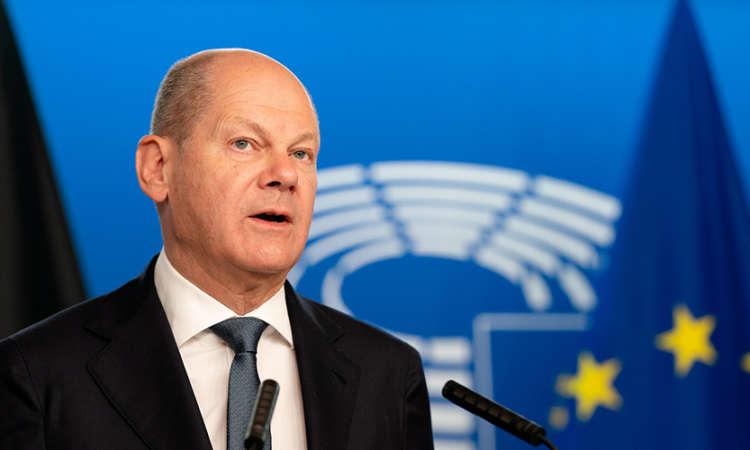
Disarray in the German coalition government over energy and growth policies is likely to hold back much needed progress on reforming Europe’s financial sector and integrating European financial structures. Experts are unanimous in calling for capital markets union as a key condition for advances on ‘greening’ the European economy, which will require large-scale funding from financial markets as well as banks and public sector investors.
However, squabbling in Chancellor Olaf Scholz’s Social Democrat (SPD)-led, three-party government over his Greens coalition partners’ plans to ban gas boilers has brought cohesion to a new low. This coincides with strained relations between France and Germany on a series of economic and financial issues – ranging from nuclear energy and armaments projects to reforming Europe’s fiscal rules and developing the European Union’s borrowing programme.
Without alignment between Berlin and Paris, Europe is unlikely to forge ahead in completing banking union in key areas such as EU-wide deposit insurance and in harmonising capital market rules. These issues were under discussion at the annual European Financial Integration Conference in Frankfurt organised in May by the Association for Financial Markets in Europe and OMFIF.
Weathering market storms
Luis de Guindos, European Central Bank vice president, underlined the need for greater efforts to regulate the non-bank financial selector, emphasising how liquidity mismatches could disrupt markets and economies. ‘As the market footprint of non-bank financial institutions increases, new risks and vulnerabilities can arise.’
Echoing a 19 May speech by Isabel Schnabel, another ECB board member, de Guindos cited the ‘stress episode’ over massive UK pension fund government bond sales in autumn 2022. This ‘amplified gilt price movements and liquidity stress’ and forced emergency Bank of England intervention.
‘The global economy has been hit by a series of unprecedented shocks,’ de Guindos said. ‘With geopolitical tensions on the rise, we may see the frequency of such shocks even increase.’ He added that strengthening the euro area’s capacity to attract and execute funding for companies required further progress on banking union and CMU.’ However, he admitted that some key issues, such as harmonising EU insolvency rules, had not made advances after years of discussions.
Christian Sewing, Deutsche Bank chief executive, opening the conference at the bank’s Frankfurt headquarters, lamented Europe’s financial fragmentation. ‘Time is running out because Europe’s capital markets continue to fall behind.’ He urged EU member states to take ‘bottom-up’ action to improve their individual market structures in parallel to pushing ahead with European capital markets union.
Disharmony over Germany’s green growth plans
The coalition discord over banning boilers and replacing them with renewable energy sources such as heat pumps brings into focus more general contradictions in the government’s ‘green growth’ plans for carbon neutrality by 2045. A compromise seems on the way to patch up the specific disagreement. But accusations of broken promises between Robert Habeck, Greens economics minister, and Christian Lindner, Free Democratic Party finance minister, have left considerable acrimony.
As leader of the junior party in the tripartite line-up, Lindner is increasingly squeezed between the SPD and Greens. He is suffering, too, from a string of FDP reverses in recent regional elections. At a separate conference of the annual economic council of the Christian Democratic Union – the main opposition party – Lindner joined Friedrich Merz, CDU chairman, in attacking Green policies, including ideas on raising taxes to pay for ‘greening’.
The CDU considered a power-sharing deal with the Greens ahead of the 2021 general election that brought Scholz to the chancellorship. But the party now is relying on reviving its traditional alliance with the FDP as the optimal route for a return to government in the next national poll in autumn 2025.
Merz assailed the Greens for abandoning their temporary tilt to liberalism and returning to their former role as a ‘command and prohibition’ party. At the same conference, Theodor Weimer, chief executive of Deutsche Börse, joined other business representatives in lamenting the overall thrust of the government’s economic stance. ‘We are making pygmies of ourselves. No one understands German energy policies,’ he complained. ‘We had the best industrial model, but now it is all being undermined. The green deal will fail unless it is backed by a proper capital market union.’
Joachim Nagel, Bundesbank president, appearing somewhat uneasy in a highly charged political atmosphere, used the CDU economic council conference platform to underline the European Central Bank’s determination to ‘slay the beast’ of inflation. He failed to elicit applause when he called upon the audience of more than 1,000 industry and finance representatives to ‘carry out the task together’. The muted reaction may indicate a lack of enthusiasm in the business community for more interest rate increases.
Now that the ECB has raised interest rates seven times since July 2022, the toughest part of its anti-inflation task could lie ahead, he said, adding that central bankers would need ‘artistry’ to stay the course. In view of the Berlin coalition’s travails, the same can be said about German politics.
David Marsh is Chairman of OMFIF.
Image source: European Parliament





